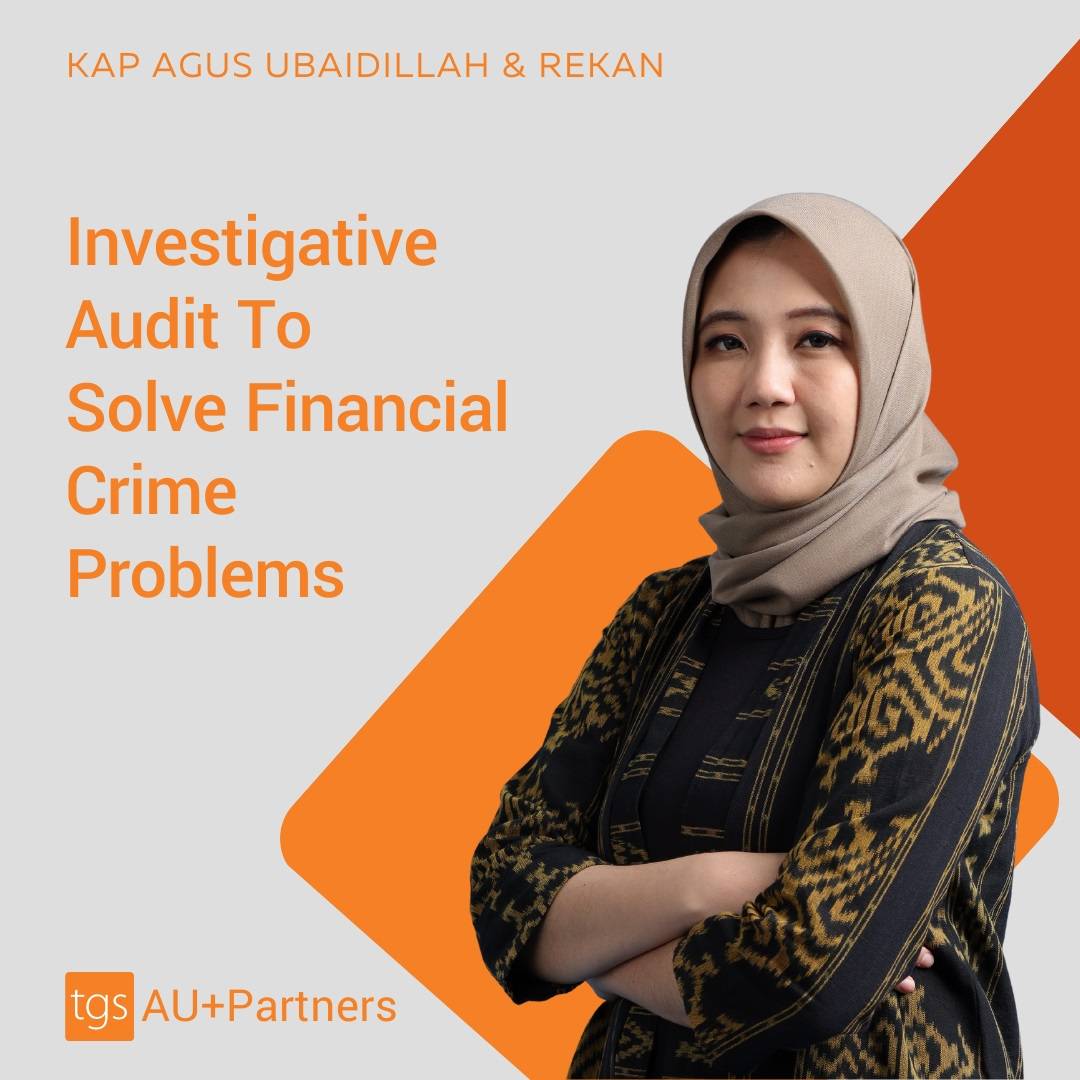Investigative Audit To Solve Financial Crime Problems
An investigative audit is a process of seeking, discovering, and gathering facts in a systematic and measurable manner with the aim of disclosing whether or not an act and the perpetrator occurred to assist stakeholders in reaching a conclusion on the benefits of reports from investigations carried out and/or used for litigation actions. However, it is the judge in court who determines whether or not an act of financial irregularity or violation of the law occurs, not a public accountant. Click here if you need Investigation Audit Services, KAP Agus Ubaidillah dan Rekan (TGS AU Partners).
Authorized Party Conducts Investigative Audit
Investigation audit service engagements can only be carried out and signed by a public accountant who has a CPI (Certified Professional Investigator) certificate issued by the Indonesian Institute of Public Accountants and maintains competence on an ongoing basis. This certificate shows that the public accountant has adequate skills in investigative audits.
Types of Investigative Audit Services
An investigative audit service engagement is an engagement in which a public accountant:

(1) Investigative examination reports factual findings on deviations from the established criteria, or evaluation or measurement of the subject matter compared to the established criteria; and/or
(2) provide financial loss accounting services with the aim of expressing a conclusion regarding the value of financial losses arising from a case/case of irregularities, and used as a direct approach or to support litigation actions; and/or
Our Service Recommendations
(3) provide expert testimony in court, namely to provide opinions/information based on the expertise of the public accountant profession in a criminal and civil case to make a case clear for Investigators and Judges.
The Approach in Investigative Audit Work
The provision of investigative audit services consists of two approaches, namely the direct approach and the litigation approach. The direct approach is a request for investigative audit services by a business entity or corporation, either beginning with suspicions of owners, the management, or those charged with governance or beginning with previous audit findings. The litigation approach is everything related to settling cases between disputing parties, either through legal channels, courts, or other adjudication agencies or other channels.
Acceptance of Investigation Audit Services Engagement
The Public Accountant accepts an investigative service engagement only if the Public Accountant's initial knowledge of the engagement conditions shows that:
Provisions of professional ethics or the relevant Public Accountant Code of Ethics such as independence and professional competence will be fulfilled and
Public Accountants who engage in investigative services must have knowledge, skills, and competence in the field of investigations obtained from formal education, training, certificates issued by IAPI and or recognized by IAPI, and work experience
Acceptance of a problem, case, or case is the initial stage of the investigative services engagement process in order to determine whether or not to engage in an investigative audit services engagement based on a risk assessment conducted by a Public Accountant, including associated parties.
The investigative audit service engagement is made in writing in an engagement letter that explains the scope of services to be performed by the Public Accountant and the responsibilities of the parties, as well as fees for the services of the Public Accountants and other relevant provisions.
Elements of Investigative Audit Services Engagement
The elements of an investigative audit service engagement performed by a Public Accountant are:
-
Three-party relationship namely:
-
Public Accountant
News & Articles Recommendations.
Public Accountants are asked to perform investigative audit services for various main matters. The Public Accountant, as an associated party, must carry out the procedure for accepting an engagement first, such as a risk assessment before accepting an engagement.
-
The party responsible for the subject matter or the incident
Namely, the party who is examined and is responsible for the subject matter information and or is responsible for managing the subject matter.
-
Intended users (Public Accountant report users)
Intended users are the group or individual addressed in the Public Accountant Report. The responsible party may be one of the intended users of the report, but not the only intended user.
-
Main subject matter and subject information
Key matters are matters that are examined and or come to attention in an investigative audit service engagement which may be in the form of information, conditions, or activities that can be evaluated or measured based on certain criteria. Examples of key issues such as financial and non-financial performance and position, systems and processes, physical and behavioral characteristics. The subject matter information is the result of evaluating or measuring the subject matter against the assessment.
-
Defined criteria
Defined criteria is a benchmark or benchmark used in an investigative service engagement to evaluate or measure subject matter, including benchmarks for relevant disclosures and disclosures. The established criteria must describe the nature of:
-
relevant to the subject matter,
that is complete has relevant factors that have an impact on the conclusion of the engagement
-
complete, namely having relevant factors that have an impact on the conclusion of the engagement
-
reliable, namely enabling consistent evaluation and measurement of the subject matter by other parties who have the same qualifications,
-
neutral, namely contributing to conclusions that are free from bias.
-
understandable namely: contributing to conclusions that are clear, comprehensive, and not susceptible to significantly different interpretations.
-
Obtained evidence
Public Accountants consider the risks of engaging in investigative audit services, as well as the quantity and quality of available evidence when planning and executing the engagement, particularly when determining the nature, timing, and extent of evidence-gathering procedures.
-
Public Accountant Report
The Public Accountant makes a written report containing conclusions based on the results of the evaluation of the evidence obtained, regarding the subject matter information, In developing conclusions, the Public Accountant considers all relevant evidence obtained, regardless of whether the evidence supports or contradicts the subject matter information.
Public accountants in handling investigative audit cases act as independent parties who are not impartial to those who request services from them or the reported party. The existence of a public accountant helps judges obtain facts from a professional perspective in deciding cases.
News & Articles Recommendations.





